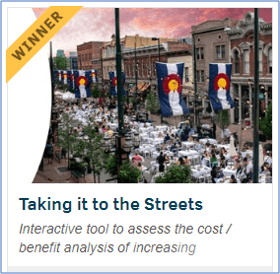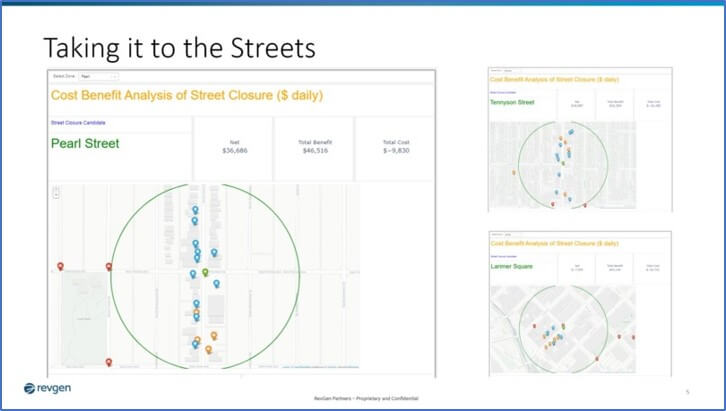How RevGen Set Up Our Internal AI Governance
How is a data & AI company handling their own AI Governance? This article gives a peek behind the curtain into our own processes and guidelines.
Read More
This winning hackathon entry provides a tool to assess the cost/benefit of expanding restaurant and shop capacity into streets

The COVID-19 pandemic has forced a slate of tough decisions on local governments. There is little precedence and big implications for how government officials respond. Here, data analytics is a powerful ally.
A team of RevGen data experts created a tool to help governments manage at least one decision. The tool helps identify ideal street closures across Denver. Those closures can give hard-hit restaurants space to expand into the street, seating more patrons while maintaining social distance.

Databricks (a leading software provider in the AI space and the summit organizer) will donate $20,000 to a local charity in recognition of the win. The team selected The Gathering Place as the recipient.
Team members Yuliya Quintela, Brian Liberatore, Stephen Idowu, and Meghan Villard built the tool after hearing about Denver’s plans to consider street closures. That extra al fresco dining space can boost restaurant revenue and spare jobs. But closing streets comes with a cost. City staff and police need to keep traffic away. Other businesses on the street lose parking. Some might lose customers; others would gain foot traffic. It becomes a complex balancing act between costs and benefits.
The team created a prototype program that automatically pulls data on all the establishments in a targeted area and imports the city’s most recent traffic counts. The program sorts the businesses and applies assumptions on the impact of a street closure.
For example, the program assigns a positive dollar value to the restaurants that see a bump in customers. It assigns a negative value to those types of businesses that would lose money. It also applies a penalty for the average number of vehicles diverted from the street. (For example, closing a block of Colorado Boulevard with 5,000 cars passing per hour would be a pricey proposition.) The output is a clear picture of the economic costs and benefits from the closure. While the assumptions are just that — assumptions — they offer a useful, unbiased means of comparing different street closures.

It’s easy to change assumptions or to add other contingencies to the calculations. The program applies those assumptions equally across all the different locations. Ultimately, the decision rests with local leaders. But the data analytics provides a helpful foundation for those decisions.
This is how we think about the power of data science in decision making. Artificial Intelligence affords unprecedented access to instant insights. It can tell us which customers might leave, what piece of machinery is likely to break, or how effective our marketing campaign will be. But for now, AI supports decisions. It doesn’t make them.
Get the latest updates and Insights from RevGen delivered straight to your inbox.